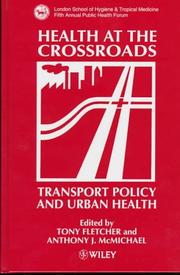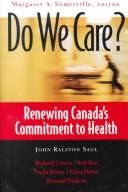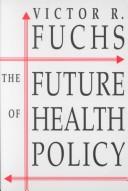| Listing 1 - 10 of 243 | << page >> |
Sort by
|
Book
Year: 2022 Publisher: Berlin Universitätsverlag der Technischen Universität Berlin
Abstract | Keywords | Export | Availability | Bookmark
 Loading...
Loading...Choose an application
- Reference Manager
- EndNote
- RefWorks (Direct export to RefWorks)
The availability and accessibility of comprehensive, high-quality data are indispensable prerequisites for effective health services research. It can be assumed in the coming years that health services research will increasingly be based on data linkage, i.e. the linking of several data sources based on suitable common key variables. In Germany, comprehensive high-quality data are routinely collected, but their suitability and availability for research purposes is limited. Therefore, the motivation for this report lies in the answering of two basic questions: which questions of health services research can be better answered abroad on the basis of better data, and in which ways such conditions could be achieved in Germany. Case studies of interesting linkage approaches from twelve countries were identified and analyzed based on a predefined conceptual framework. Information on all comparison countries or case studies was first identified from publicly available sources. Profiles were then created for each country and case study and forwarded to appropriate country experts for validation and completion. The report presents an overview of the included case studies (chapter 3), as well as key information per country and case study in the appendix. This is followed by a closer look at the possibilities of using routine data (chapter 4), linkage approaches with and without unique personal identifiers (chapter 5), the different access routes for researchers (chapter 6), options for using data from electronic patient or health records for research (chapter 7), and an interim conclusion (chapter 8). The report ends with a wish list for possible regulatory changes in light of the current policy debate in Germany (Chapter 9). It is important to underline here that case studies from the international comparison were selected to highlight important aspects that could be relevant to the challenges in Germany. In addition to the added value of comparatively easily accessible, extensive claims data, which are available more quickly than in Germany, allow cross-sector analyses and can be linked to health data and regional data on a person-by-person basis, the potential of databases created on the basis of the routine documentation of service providers (usually electronic health records) is also discussed. Investing in this direction can not only provide insights for a country’s own healthcare system, but also promote international cooperation and contribute to the international visibility of scientific excellence. A juxtaposition of the data sets available in Germany and those used in other countries suggests that the discussion in Germany should focus first and foremost on optimizing the availability and accessibility of existing data and consider new approaches to the collection of additional information as a supplement.
Book
Year: 2022 Publisher: Berlin Universitätsverlag der Technischen Universität Berlin
Abstract | Keywords | Export | Availability | Bookmark
 Loading...
Loading...Choose an application
- Reference Manager
- EndNote
- RefWorks (Direct export to RefWorks)
The availability and accessibility of comprehensive, high-quality data are indispensable prerequisites for effective health services research. It can be assumed in the coming years that health services research will increasingly be based on data linkage, i.e. the linking of several data sources based on suitable common key variables. In Germany, comprehensive high-quality data are routinely collected, but their suitability and availability for research purposes is limited. Therefore, the motivation for this report lies in the answering of two basic questions: which questions of health services research can be better answered abroad on the basis of better data, and in which ways such conditions could be achieved in Germany. Case studies of interesting linkage approaches from twelve countries were identified and analyzed based on a predefined conceptual framework. Information on all comparison countries or case studies was first identified from publicly available sources. Profiles were then created for each country and case study and forwarded to appropriate country experts for validation and completion. The report presents an overview of the included case studies (chapter 3), as well as key information per country and case study in the appendix. This is followed by a closer look at the possibilities of using routine data (chapter 4), linkage approaches with and without unique personal identifiers (chapter 5), the different access routes for researchers (chapter 6), options for using data from electronic patient or health records for research (chapter 7), and an interim conclusion (chapter 8). The report ends with a wish list for possible regulatory changes in light of the current policy debate in Germany (Chapter 9). It is important to underline here that case studies from the international comparison were selected to highlight important aspects that could be relevant to the challenges in Germany. In addition to the added value of comparatively easily accessible, extensive claims data, which are available more quickly than in Germany, allow cross-sector analyses and can be linked to health data and regional data on a person-by-person basis, the potential of databases created on the basis of the routine documentation of service providers (usually electronic health records) is also discussed. Investing in this direction can not only provide insights for a country’s own healthcare system, but also promote international cooperation and contribute to the international visibility of scientific excellence. A juxtaposition of the data sets available in Germany and those used in other countries suggests that the discussion in Germany should focus first and foremost on optimizing the availability and accessibility of existing data and consider new approaches to the collection of additional information as a supplement.
Book
Year: 2022 Publisher: Berlin Universitätsverlag der Technischen Universität Berlin
Abstract | Keywords | Export | Availability | Bookmark
 Loading...
Loading...Choose an application
- Reference Manager
- EndNote
- RefWorks (Direct export to RefWorks)
The availability and accessibility of comprehensive, high-quality data are indispensable prerequisites for effective health services research. It can be assumed in the coming years that health services research will increasingly be based on data linkage, i.e. the linking of several data sources based on suitable common key variables. In Germany, comprehensive high-quality data are routinely collected, but their suitability and availability for research purposes is limited. Therefore, the motivation for this report lies in the answering of two basic questions: which questions of health services research can be better answered abroad on the basis of better data, and in which ways such conditions could be achieved in Germany. Case studies of interesting linkage approaches from twelve countries were identified and analyzed based on a predefined conceptual framework. Information on all comparison countries or case studies was first identified from publicly available sources. Profiles were then created for each country and case study and forwarded to appropriate country experts for validation and completion. The report presents an overview of the included case studies (chapter 3), as well as key information per country and case study in the appendix. This is followed by a closer look at the possibilities of using routine data (chapter 4), linkage approaches with and without unique personal identifiers (chapter 5), the different access routes for researchers (chapter 6), options for using data from electronic patient or health records for research (chapter 7), and an interim conclusion (chapter 8). The report ends with a wish list for possible regulatory changes in light of the current policy debate in Germany (Chapter 9). It is important to underline here that case studies from the international comparison were selected to highlight important aspects that could be relevant to the challenges in Germany. In addition to the added value of comparatively easily accessible, extensive claims data, which are available more quickly than in Germany, allow cross-sector analyses and can be linked to health data and regional data on a person-by-person basis, the potential of databases created on the basis of the routine documentation of service providers (usually electronic health records) is also discussed. Investing in this direction can not only provide insights for a country’s own healthcare system, but also promote international cooperation and contribute to the international visibility of scientific excellence. A juxtaposition of the data sets available in Germany and those used in other countries suggests that the discussion in Germany should focus first and foremost on optimizing the availability and accessibility of existing data and consider new approaches to the collection of additional information as a supplement.
Book
ISBN: 0262374854 0262374862 0262545691 Year: 2023 Publisher: Cambridge, Massachusetts : The MIT Press,
Abstract | Keywords | Export | Availability | Bookmark
 Loading...
Loading...Choose an application
- Reference Manager
- EndNote
- RefWorks (Direct export to RefWorks)
"Examines the US securitization of the 2013-2016 Ebola outbreak, exploring how Ebola was understood as a security threat and how this impacted on the US response to the health crisis"--

ISBN: 0471962724 Year: 1996 Publisher: New York ; Chichester ; Toronto J. Wiley
Abstract | Keywords | Export | Availability | Bookmark
 Loading...
Loading...Choose an application
- Reference Manager
- EndNote
- RefWorks (Direct export to RefWorks)

ISBN: 1282858173 9786612858178 0773567941 9780773567948 0773518789 9780773518780 0773518770 9780773518773 Year: 1999 Publisher: Montreal [Que.] McGill-Queen's University Press
Abstract | Keywords | Export | Availability | Bookmark
 Loading...
Loading...Choose an application
- Reference Manager
- EndNote
- RefWorks (Direct export to RefWorks)
One of Canada's preeminent social thinkers, John Ralston Saul, begins the book with a harsh reminder that public policy can be successful only when driven by the humanistic principles which fueled its formulation. Once saving money becomes a goal in itself, rather than "something we do on the side," public policy has little chance of survival. In subsequent chapters introducing the five key areas, Dr. Richard Cruess (McGill) and Dr. Sylvia Cruess (McGill) write on the physician's role in society; the Honourable Bob Rae tackles the political challenges of health care in the consumer era; Professor Raisa Deber (Toronto) looks at the rightful place of economics in health policy; Sister Nuala Kenny (Dalhousie) examines the ethical dilemmas we face; and Professor Bernard Dickens (Toronto) describes how current health care issues are perceived by the law. Other contributors represent a "who's who" of Canada's most highly recognized academics, professionals, and policy-makers. Also writing on clinical practice are Pat Kelly (PISCES), Dr. Terrence Montague (Merck Frosst), and Dr. Hugh Scully (Cardiac Care Network). The Honourable Monique Bégin, Mark Wainberg (International AIDS Society), and Rev. Lois Wilson (Senator, Canadian Parliament) write on politics. Nathalie St. Pierre (Fédération Nationale des Associations des Consommateurs du Québec), Devidas Menon (Institute of Pharmaco-Economics), and Dr. John Wade (Former Deputy Minister of Health, Manitoba) discuss economics. Tim Caufield (Alberta), Maurice McGregor (McGill), and Lesley Degner (St. Boniface Research Centre) consider ethical issues. Marcia Rioux (Roeher Institute), Jamie Cameron (York), and Henry Dinsdale (Royal College of Physicians and Surgeons) deal with the law. Do We Care? is a must-read for anyone involved in decision-making about the future of Canadian health care -- and for all of us who are affected by these decisions. Do We Care? is the result of a conference entitled "Directions for Canadian Health Care: A Framework for Sound Decisions" which was held in Toronto in October of 1998.
Electronic books. --- Medical policy -- Canada. --- Medical policy --- Health Policy --- Healthcare Policy --- National Health Policy --- Health Policies --- Health Policy, National --- Healthcare Policies --- National Health Policies --- Policy, Health --- Policy, Healthcare --- Policy, National Health --- Policy Making --- Canada. --- Health Care Policies --- Care Policies, Health --- Health Care Policy --- Policies, Health --- Policies, Health Care --- Policies, Healthcare --- Policy, Health Care --- Health care reform

ISBN: 0511042973 9780511042973 0585358834 9780585358833 1900151529 Year: 2000 Publisher: London
Abstract | Keywords | Export | Availability | Bookmark
 Loading...
Loading...Choose an application
- Reference Manager
- EndNote
- RefWorks (Direct export to RefWorks)
Mental Disorders --- Mental Health Services --- Health Policy. --- Healthcare Policy --- National Health Policy --- Health Policies --- Health Policy, National --- Healthcare Policies --- National Health Policies --- Policy, Health --- Policy, Healthcare --- Policy, National Health --- Policy Making --- therapy. --- organization & administration. --- Health Care Policies --- Care Policies, Health --- Health Care Policy --- Policies, Health --- Policies, Health Care --- Policies, Healthcare --- Policy, Health Care
Book
ISBN: 1009090550 1009090356 1009099612 1316515206 Year: 2023 Publisher: Cambridge, United Kingdom ; New York, NY : Cambridge University Press,
Abstract | Keywords | Export | Availability | Bookmark
 Loading...
Loading...Choose an application
- Reference Manager
- EndNote
- RefWorks (Direct export to RefWorks)
Health care costs in the United States are much higher than in other countries. These cost differences can be explained in part by a lack of competition in the United States. Some markets, such as pharmaceuticals and medical equipment, have elements of monopoly. Other markets, such as health insurance, have elements of monopsony. Many other markets may be subject to collusion on prices, such as generic drugs, or wages, such as the nurse labor market. Lawful monopoly and monopsony are beyond the reach of antitrust laws, but collusion is not. When appropriate, vigorous antitrust enforcement challenging anticompetitive conduct can aid in reducing health care costs. This book addresses monopoly, monopsony, cartels of sellers and buyers, horizontal and vertical merger policy, and antitrust enforcement through private suits as well as the efforts of the antitrust Agencies. The authors demonstrate how enforcing antitrust laws can ultimately promote competition and reduce health care costs.
Health Care Sector --- Health Policy --- Antitrust Laws --- Marketing of Health Services --- economics --- organization & administration --- methods --- United States --- Health Care Policies --- Health Policies --- Healthcare Policy --- National Health Policy --- Care Policies, Health --- Health Care Policy --- Health Policy, National --- Healthcare Policies --- National Health Policies --- Policies, Health --- Policies, Health Care --- Policies, Healthcare --- Policy, Health --- Policy, Health Care --- Policy, Healthcare --- Policy Making --- Medical economics --- Antitrust law
Book
ISBN: 1978832141 Year: 2023 Publisher: Rutgers University Press
Abstract | Keywords | Export | Availability | Bookmark
 Loading...
Loading...Choose an application
- Reference Manager
- EndNote
- RefWorks (Direct export to RefWorks)
The slow violence being inflicted on our environment—through everything from carbon emissions to plastic pollution—also represents an impending public health catastrophe. Yet standard health care practices are more concerned with short-term outcomes than long-term sustainability. Every resource used to deliver medical care, from IV tubes to antibiotics to electricity, has a significant environmental impact. This raises an urgent ethical dilemma: in striving to improve the health outcomes of individual patients, are we damaging human health on a global scale? In Dying Green, award-winning educator Christine Vatovec offers an engaging study that asks us to consider the broader environmental sustainability of health care. Through a comparative analysis of the care provided to terminally ill patients in a conventional cancer ward, a palliative care unit, and an acute-care hospice facility, she shows how decisions made at a patient’s bedside govern the environmental footprint of the healthcare industry. Likewise, Dying Green offers insights on the many opportunities that exist for reducing the ecological impacts of medical practices in general, while also enhancing care for the dying in particular. By envisioning a more sustainable approach to care, this book offers a way forward that is better for both patients and the planet.
Medical care --- Medical economics. --- Terminal care --- Medical wastes --- Sustainability. --- Environmental aspects. --- Economic aspects. --- cancer, death, end-of-life, care, health care, health, policy, health policy, end of life, end-of-life care, hospital, medicine, medical care, costs, economy, environment, ecology.

ISBN: 0674338251 Year: 1993 Publisher: Cambridge, Mass. Harvard University Press
Abstract | Keywords | Export | Availability | Bookmark
 Loading...
Loading...Choose an application
- Reference Manager
- EndNote
- RefWorks (Direct export to RefWorks)
Social policy --- United States --- Economics, Medical. --- Health Policy. --- National Health Policy --- Health Policies --- Health Policies, National --- Health Policy, National --- National Health Policies --- Policies, Health --- Policies, National Health --- Policy, Health --- Policy, National Health --- Policy Making --- Medical Economics --- Medicine --- economics --- United States. --- Medical economics --- Medical policy --- Economics, Medical --- Health Policy --- Healthcare Policy --- Healthcare Policies --- Policy, Healthcare --- Health Care Policies --- Care Policies, Health --- Health Care Policy --- Policies, Health Care --- Policies, Healthcare --- Policy, Health Care --- United States of America
| Listing 1 - 10 of 243 | << page >> |
Sort by
|

 Search
Search Feedback
Feedback About UniCat
About UniCat  Help
Help News
News